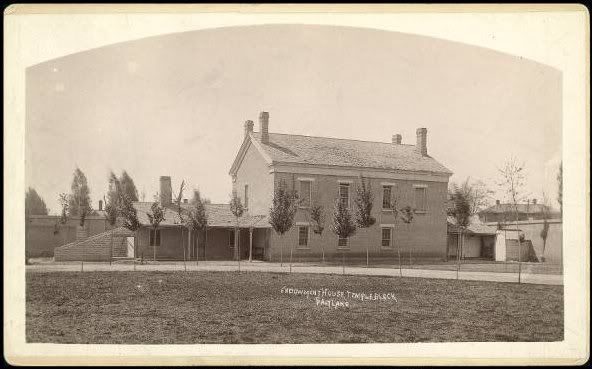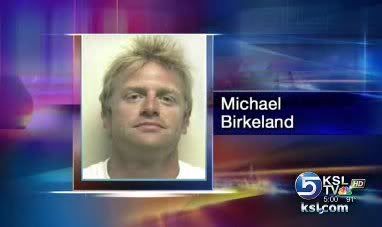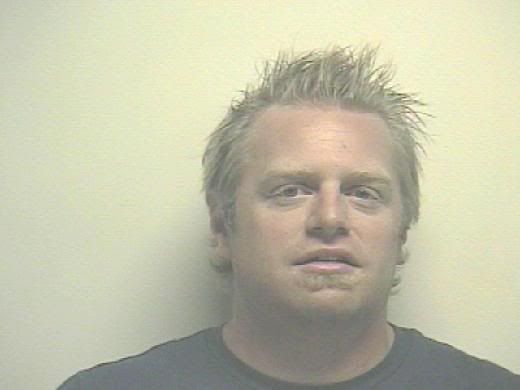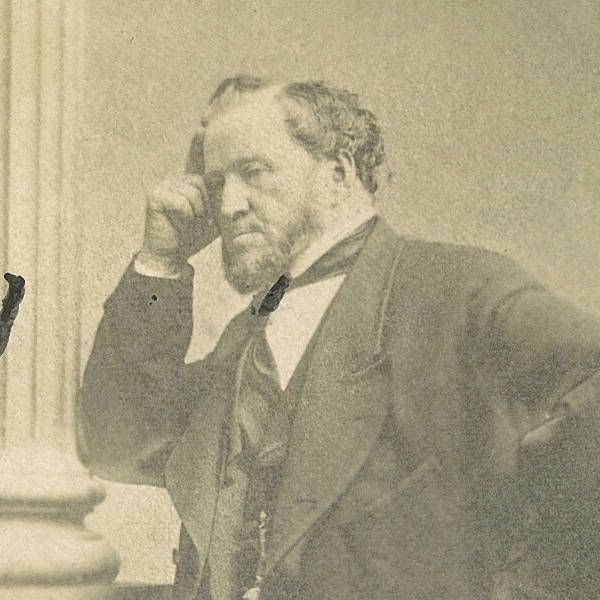Rebaptism and the Mormon Reformation
or "I will take you into the waters of baptism"
Brigham Young
September 21, 1856
My counsel to them today is, as it has been on former occasions to all who have come into these valleys, Go and be baptized for the remission of sins, repenting of all your wanderings from the path of righteousness, believing firmly, in the name of Jesus Christ, that all your sins will be washed away...
Brigham had made it clear that baptism, in and of itself, was not efficacious to wash away sins. He emphasized the covenant behind the ordinance, lest any Saint put their trust in what Moroni called "dead works" (Moroni 8:23):I have heard of some of you cursing and swearing, even some of the Elders of Israel. I would be baptized seven times, were I in your place; I would not stop teasing some good Elder to baptize me again and again, until I could think my sins forgiven. I would not live over another night until I was baptized enough to satisfy me that my sins were forgiven. Then go and be confirmed, as you were when you first embraced the religion of Jesus. That is my counsel (JD 2:8-9).
Has water, in itself, any virtue to wash away sin? Certainly not; but the Lord says, “If the sinner will repent of his sins, and go down into the waters of baptism, and there be buried in the likeness of being put into the earth and buried, and again be delivered from the water, in the likeness of being born—if in the sincerity of his heart he will do this, his sins shall be washed away.”
Will the water of itself wash them away? No; but keeping the commandments of God will cleanse away the stain of sin (JD 2:4).Today members of the LDS Church are baptized once, excepting excommunicated members who must be rebaptized if they wish to join the Church again. Instead of rebaptism in general, the sacrament, or Lord's Supper, is emphasized as a renewal of the baptismal covenant each Sunday in Church services.[1] Rebaptism, however, was not uncommon in this earlier period of Church history, especially for emigrants entering the Salt Lake valley; they would often rededicate themselves through baptism to withstand the rigors of desert living, as well as witness their continued faith and commitment to the Lord and His kingdom.
By 1856 it seems things hadn't progressed spiritually as much as Brigham would have liked. Intimations of a "reformation" could be detected in some of his and other Church leaders' sermons in early 1856.[2] Among other things, Brigham had mentioned people who were "full of contention, full of covetousness, full of pride, and full of iniquity" (JD 4:43). Things really picked up when Jedediah M. Grant was called to the First Presidency after which he began vigorous calls to repentance sparking a large-scale effort to rekindle the faith of the Saints. In early September, 1856 Grant traveled to preach at a stake conference at Kaysville and then Farmington, Utah, enjoining the Saints to repent and to manifest their faith by being rebaptized. The Deseret News called it "The Great Reformation," or the Mormon Reformation. Hundreds of Latter-day Saints were rebaptized and reconfirmed members of the Church.[3]
One week later Grant joined Brigham at a meeting in the Bowery in Salt Lake. Brigham stood before the congregation and started in:
I have an impulse within me to preach the Gospel of salvation...Brigham said he felt many were "preparing for apostasy," especially hypocrites who would not to be tolerated, that he would be like a "flaming sword" against them. All who wished to "awake out of their lethargy and walk up to their religion, to their duty, to the highest privilege that ever was or ever can be granted to mortal man upon this earth, which is eternal life," could witness such by being rebaptized; some by Brigham himself:
I feel to call upon this congregation to know whether any of them, or whether all of them wish salvation. If they do, I have the Gospel of salvation for them; and I call upon the people to know whether they are the friends of God, or only of themselves individually. I do not know of any better way to get an expression from the people, as to whether they wish the Gospel preached to them, whether they desire to believe in the Lord Jesus Christ, to obey his counsels, and live to his glory, denying themselves of worldly lusts and of everything that is sensual and contrary to his Gospel, and feel as though they wanted to be Saints of the Most High, than to have the brethren and sisters, those who so wish and desire, manifest it by rising upon their feet. You will observe all who do not rise.
[The vast congregation all responded by standing up.]
Take your seats again. You have manifested that you want to be Saints, and I am happy for the privilege of talking to such a people.
When we get the font prepared that is now being built,[4] I will take you into the waters of baptism, if you repent of your sins. If you will covenant to live your religion and be Saints of the Most High, you shall have that privilege, and I will have the honor of baptizing you in that font, or of seeing that it is done.Otherwise, Brigham said "the thread must be severed; for I cannot hold men and women in fellowship that serve the devil and themselves, and give no heed to the Almighty; I cannot do it."
Brigham felt, given all the Saints had been taught regarding God, Christ, life and salvation, many of them seemed to still lack understanding. "Where is the man, the officer, or the community," he asked, "that understands what has been taught them?" Generally, from what he saw, people tended to close their eyes to eternal things, focusing instead on "that which pleases the eye, that which is in accordance with the lusts of the flesh, that which is full of iniquity; and they care not for the righteousness of our God. I repeat that, as far as those who are disposed to refrain from their evils, to renew their covenants and live their religion, I will have the honor and you the privilege of going forth and renewing your covenants, otherwise their must be a separation."
What seemed to concern Brigham most at the time was materialism, and despite his repeated admonitions he said he felt his instruction was "pass[ing] into [their] ears and out again, and is no more remembered." Echoing the Book of Mormon, wherein land and prosperity was promised to those who seek God above all else, Brigham warned that "this people will not be suffered to walk as they have walked, to do as they have done, to live as they have lived. God will have a reckoning with us ere long, and we must refrain from our evils and turn to the Lord our God, or He will come out in judgment against us...Show me the man who knows enough about his God, and is sufficiently acquainted with the principle of eternal lives to be able to say, “I can handle...the possessions of this world...I know how to use them, to deal out this and to distribute that, and to do all to the glory of my Father in heaven...”
Just as quick as you are prospered you are lost to the Lord, you are filled with darkness....I have taught you these things weeks and months ago, and yet there is not a man or woman in this congregation that understands them in their fulness. These are simple principles that should be learned...[5]
In the coming months the rhetoric to stir the hearts of the Saints would only increase as the reformation spread through the territory. It seems the leaders wanted to light a fire under members who were stagnating, putting the fear of God in them, so to speak, as subsequent posts will discuss.[6] Brigham concluded:
Well, I just say, my brethren and sisters, it cannot be suffered any longer, a separation must take place; you must part with your sins, or the righteous must be separated from the ungodly. I will now give way, and call upon others of the brethren to speak to you. Amen (JD 4:43-45).
The following Sunday the reformation continued in earnest. Members of the First Presidency and several home missionaries addressed crowded meetings at the bowery during both the morning and afternoon. At 5:30 p.m. the people gathered at the new baptismal font and a great number were rebaptized and afterwards reconfirmed under Grant's direction.[7]
Footnotes:
[1]
"Today the sacrament is an ordinance in which Church members partake of bread and water in remembrance of Jesus Christ's atoning sacrifice. This ordinance is an essential part of worship and spiritual development. Through this ordinance, Church members renew the covenants they made with God when they were baptized." (LDS.org Gospel Topics, "Baptism.") See also Robert D. Hales, “The Covenant of Baptism: To Be in the Kingdom and of the Kingdom,” Ensign, Nov 2000, 6–9, among countless other conference addresses and writings on the subject.
[2]
Fiery rhetoric played a part in the Mormon reformation. 1856 examples include Brigham Young, (see "Preaching Pitchforks From the Pulpit") and Heber C. Kimball (see "Contrasting Attitudes: Keeping things in context"). Jedediah M. Grant was especially known to speak strongly and was nicknamed "Brigham's Hammer." He played a large role in the reformation preaching and baptizing. After a vigorous speaking tour of northern Utah settlements and sessions of baptisms Grant caught pneumonia. Despite administrations by various Church leaders, Grant died December 1, 1856. For more, see Eugene E. Campbell, Establishing Zion: The Mormon Church in the American West, 1847-1869, Signature Books, 1988, pp.192-194.
[3]
Earlier Brigham had discussed the virtues of Utah as a "saint-raising country," but knew the harsh reality was prone to make life difficult for even the most faithful. For example, see "Utah: Saint-Raising Country." For more on the reformation, see Paul H. Peterson, "Reformation (LDS) OF 1856-1857," Encyclopedia of Mormonism; Eugene E. Campbell, Establishing Zion: The Mormon Church in the American West, 1847-1869, Signature Books, 1988.
[4]
This font was built as an additional west wing of the Endowment House where various ordinances were completed prior to the completion of full temples. This font was dedicated October 6,1856. See Lamar C. Berrett, "Endowment Houses," Encyclopedia of Mormonism, p. 456; A. William Lund. "History of the Salt Lake Endowment House." Improvement Era, 39 (Apr. 1936):213. The image "Endowment House, Temple Block, Salt Lake" was taken by Charles Savage. (BYU Lee Library, L. Tom Perry Special Collections, MSS P 24 Item 420.)
Interestingly, baptisms for "healing" were also performed. See Jonathan Stapley, "Baptism For Healing," Splendid Sun blog, Nov. 3, 2005, accessed 7/15/2008.
[5]
A month earlier, on September 17, Brigham had preached a remarkable on the same subject; that of making one's interest God's interest. See "Implicit Confidence in God"; specifically parts 3 and 4. Also, see the same sentiments expressed in 1852, "Cast from you the love of the world."
[6]
For intimations of the reformation and a brief introduction to some of the more abrasive rhetoric employed by Church leaders, see "Preaching Pitchforks From the Pulpit."[7]
Campbell, opt. cit. p. 188.




 20
Comments
20
Comments




